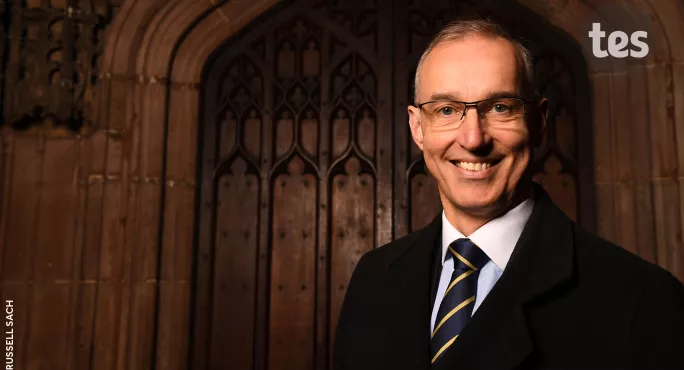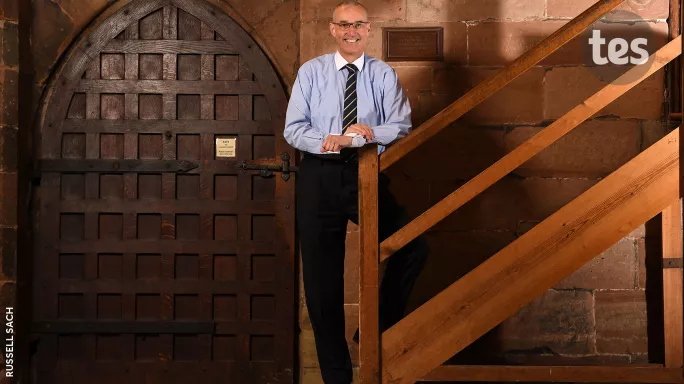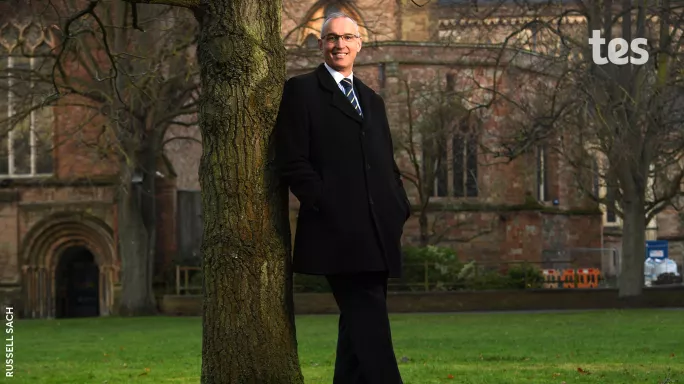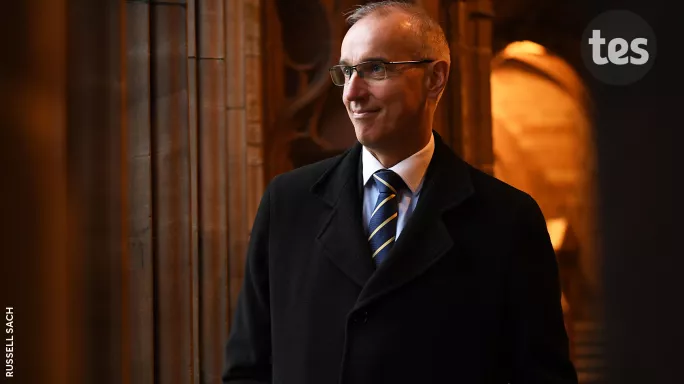- Home
- Teaching in grammar schools ‘is not the easy life’
Teaching in grammar schools ‘is not the easy life’

As a fresh-faced history teacher, Mark Fenton’s first job was at comprehensive school in a “mixed area” of Chelmsford, Essex, in the late 1980s.
One of the things he liked about the school was the “real community feel” and the fact that almost all the children lived close enough to walk to school.
Yet he became concerned that not enough was being done to stretch the most able students.
Read: Grammars ‘boost poorer pupils’ chances of getting into top universities’
Tes analysis: Are the grammar school floodgates about to open?
Exclusive: 700 pupils get grammar places without passing 11-plus
“One of the things the school didn’t do particularly well was in giving the pupils aspirations towards success at the really top level,” he says.
At the time, streaming was “very much out of fashion,” and, in fact, the head was reversing it and going for mixed-ability teaching “in a big way”.
So when a job came up at the grammar school down the road, Fenton went for it. Aged 25, he became head of department, which was a “ridiculously young age”, and began a career in grammar schools that would span the next 30 years, mostly in leadership roles, and perhaps most notably as headmaster of Dr Challoner’s Grammar School, in Amersham, Buckinghamshire, between 2001 and 2016.
Today, as the leader of the Grammar School Heads Association, he is a key representative of the sector that he believes offers the best education for the country’s most able pupils.
Different challenges
“I remember my first cover lesson [in a grammar school],” he says. “Previously cover lessons [at my comprehensive] were a full-time management challenge and I started off by saying ‘Mr So-and-So isn’t here, but he’s left the work and I’ll write it on the board.’ And then they just got on with it and did it, and I thought what do I do now for the next half an hour?”
But he says teaching in a grammar school has different challenges. “It’s easier in some ways - probably in terms of behaviour management it’s more straight forward. But on the other hand, in terms of marking workload and general expectation on you, it can be pretty testing. So it’s not the easy, comfortable life that some people believe it to be.”

Fenton took over as the new chief executive of the Grammar School Heads Association (GSHA) in September, where he represents 163 heads who in turn represent 167,000 pupils, which is around 5 per cent of the total for England.
Not worth the aggravation
These are numbers which he doesn’t believe will increase in the near future because the government “doesn’t think it’s worth the aggravation” from the anti-selection camp.
“There’s a very different view among parents and the general public to what there is in the educational establishment,” he says.
“I suppose if you’re the government, where do your priorities lie and how many vested interests do you take on at any one time? Somebody must have made a calculation that the benefits aren’t worth the level of aggravation.”
But Fenton is nevertheless clear about what grammar schools offer, and rolls off some eye-catching statistics on how they help pupils get into top universities.
He cites 2019 research from former Department for Education principal official Iain Mansfield, which includes the point that a pupil from the most disadvantaged quintile is more than twice as likely to progress to Oxbridge if they live in a selective area, and black, Asian and/or minority ethnic (BAME) pupils more than five times as likely.
It’s also the case, he says, that in selective areas, 39 per cent of pupils from grammar and secondary modern schools combined won places at highly-selective universities - compared with only 23 per cent in comprehensive areas.
And despite 76 per cent of local authorities having no grammar schools, nearly 2,000 comprehensive schools send only slightly more pupils to Oxbridge than all 163 grammar schools.

“Unlike the bastions of privilege which they are sometimes thought of, actually grammars take a reasonable cross-section of the normal population by income,” says Fenton.
Competing with £35k a year schools
“Forty-five per cent of grammar school students are on median income or below, and, in terms of the success of getting those able youngsters into competitive universities, grammars are way more successful than any other type of school - so it’s a magic formula and competes with people who pay £35,000 a year [for private schools].”
The research by Mansfield has only this week been attacked by academics who say his methodology is “flawed”.
They say, for example, that the DfE data on household income for grammar pupils is incomplete and that “large numbers” of higher-income families are excluded, making it appear that a larger proportion of pupils in grammar schools come from poorer households than is actually the case.
But when it comes to disadvantaged pupils, Fenton hopes the number will increase over time and says the GSHA is making “great efforts” in this.
The GSHA has a partnership with a software company, for example, which puts all 11-plus test material online, and schools give out log-ins for the material to children from Pupil Premium backgrounds.
“We can track, and schools [themselves] can track, exactly how they’re doing in the practice tests, and their level of improvement over time, and then monitor how they perform in the actual test,” he says.
The reality is, says Fenton, that nationally only 5 per cent of Pupil Premium children achieve a “high-scaled score” of 110 or more in reading and mathematics in key stage 2 Sats - as well as being teacher-assessed in writing as “working at a greater depth within the expected standard”.
He says this is only “slightly less” than the proportion of Pupil Premium children in grammar schools.

At 54, Fenton is still fresh-faced. There is a brightness and energy in his eyes. He has recently returned from South Africa where he’s been watching the test cricket. His other passion is choral singing, and he performs in a semi-professional choir for which he must shortly dash back home to Worcester from London for a rehearsal. It’s for a performance of Bach’s Mass in D-minor, which the choir will perform in a mini tour, which includes performances in Warwick, Cardiff and London.
Being part-time in his role at the GSHA also allows him to study an MA in contemporary British history at Kings College, London, to complement his PhD in and MA in education.
Fenton himself attended a grammar school, in Brentwood, Essex. It was a direct grant grammar school for which the government abandoned funding around the time he started. But he was fortunate, he says, in that his parents, both hospital doctors, were able to afford the fees when it became an independent school.
At Cambridge University he enjoyed meeting people from “a wide variety of backgrounds” and says his best friend was from a comprehensive in Manchester.
Preventing ‘great waste’
He experienced real levels of deprivation as deputy head of a grammar school in Rochester, Kent.
“I did a home visit with the education welfare officer to a family who had a reputation for brushes with the law to say the least.
“But this was a bright boy, and I remember sitting around the kitchen table with him pleading with him to come into school. He found it quite tough because he came from a very different background to some of the other pupils in the school.
“He did eventually get five GCSEs. To me, it would have been a great waste if he hadn’t been able to do that. I suspect if he had been in most other schools he would have been quietly forgotten about.”
Mark Fenton CV
Education
• Brentwood School 1973-83
• History at Cambridge University 1984-87
• PGCE at London University Institute of Education 1987-88
• Anglia Ruskin University 1990-97 (part-time) MSc and PhD in education management
• University of Buckingham 1999-2000 (part-time), postgraduate diploma in education law
• King’s College, London (MA in contemporary British history) 2018-20
Teaching and executive experience
• Chief executive, Grammar School Heads Association (2019- )
• Chief master, King Edward’s School Birmingham and head master of the schools of King Edward VI in Birmingham (2016-18)
• Headmaster, Dr Challoner’s Grammar School, Amersham (2001-16)
• Executive headteacher, Ealing Fields Academy Trust (2014-16)
• Deputy head, Sir Joseph Williamson’s Mathematical School, Rochester (1997-2001)
• Assistant head, King Edward VI Grammar School, Chelmsford (1994-97)
• Head of history and politics, King Edward VI Grammar School, Chelmsford (1991-97)
• Teacher of history, The Boswells Comprehensive School, Chelmsford (1988-91)
Keep reading for just £1 per month
You've reached your limit of free articles this month. Subscribe for £1 per month for three months and get:
- Unlimited access to all Tes magazine content
- Exclusive subscriber-only stories
- Award-winning email newsletters



